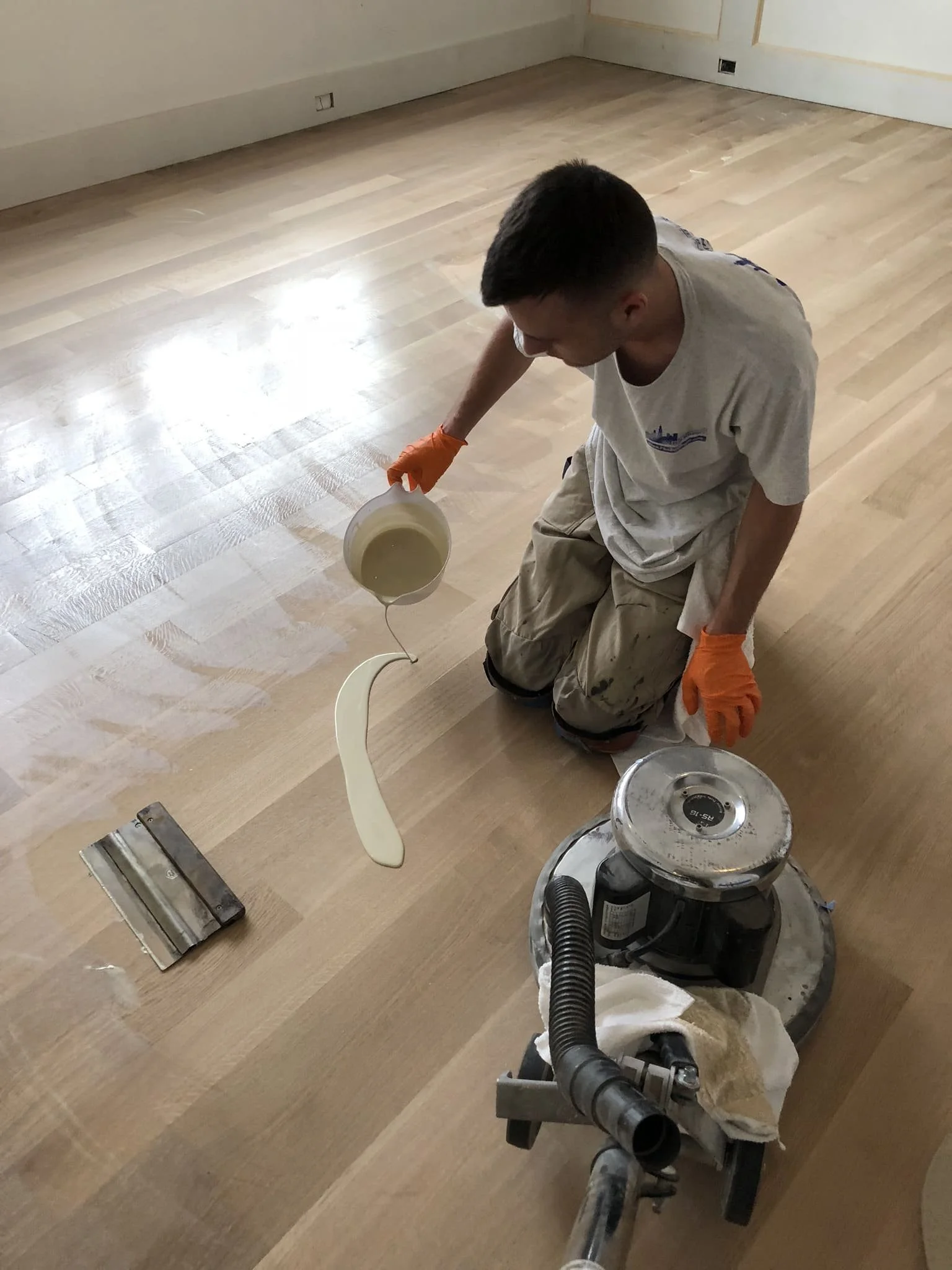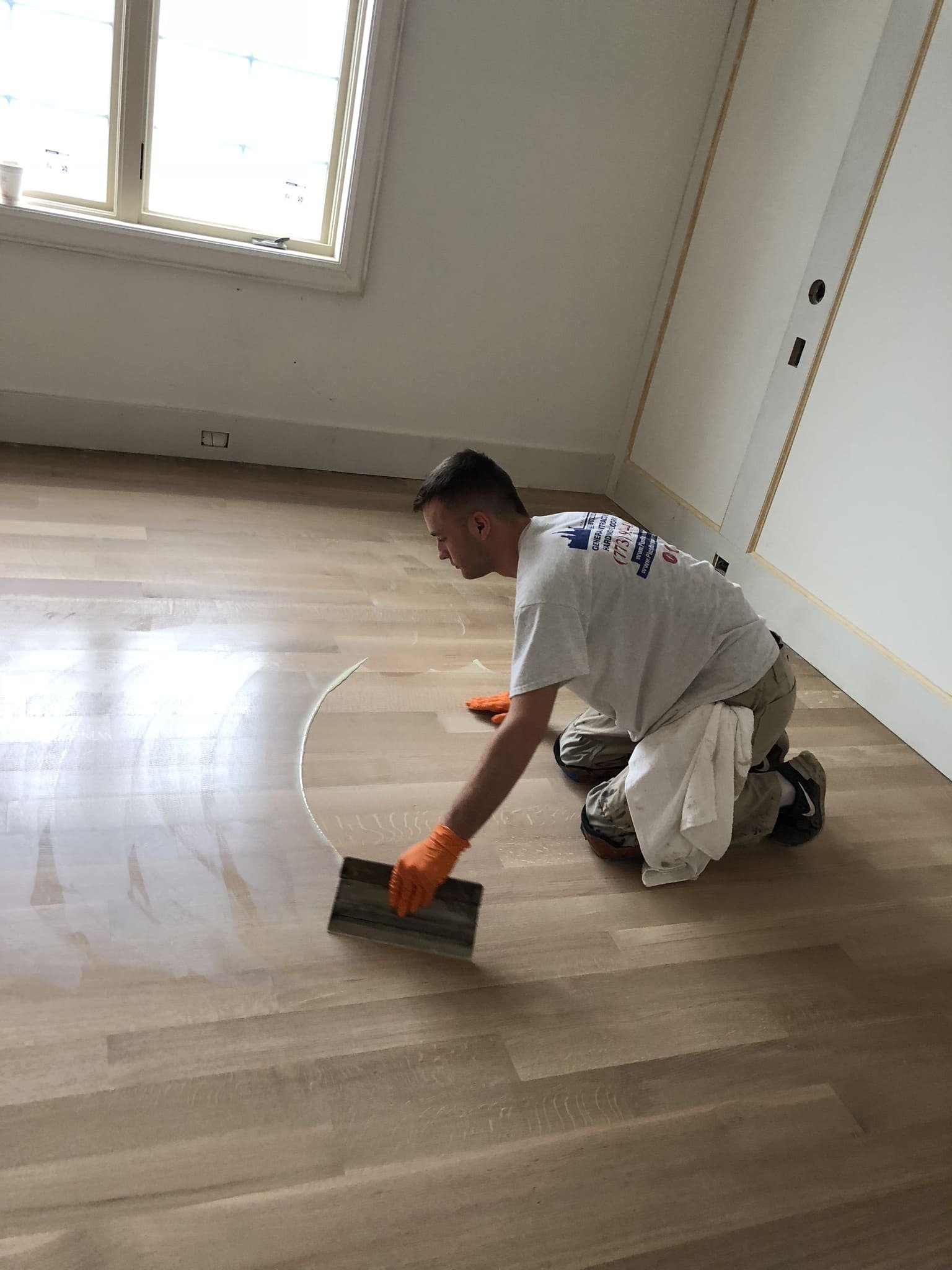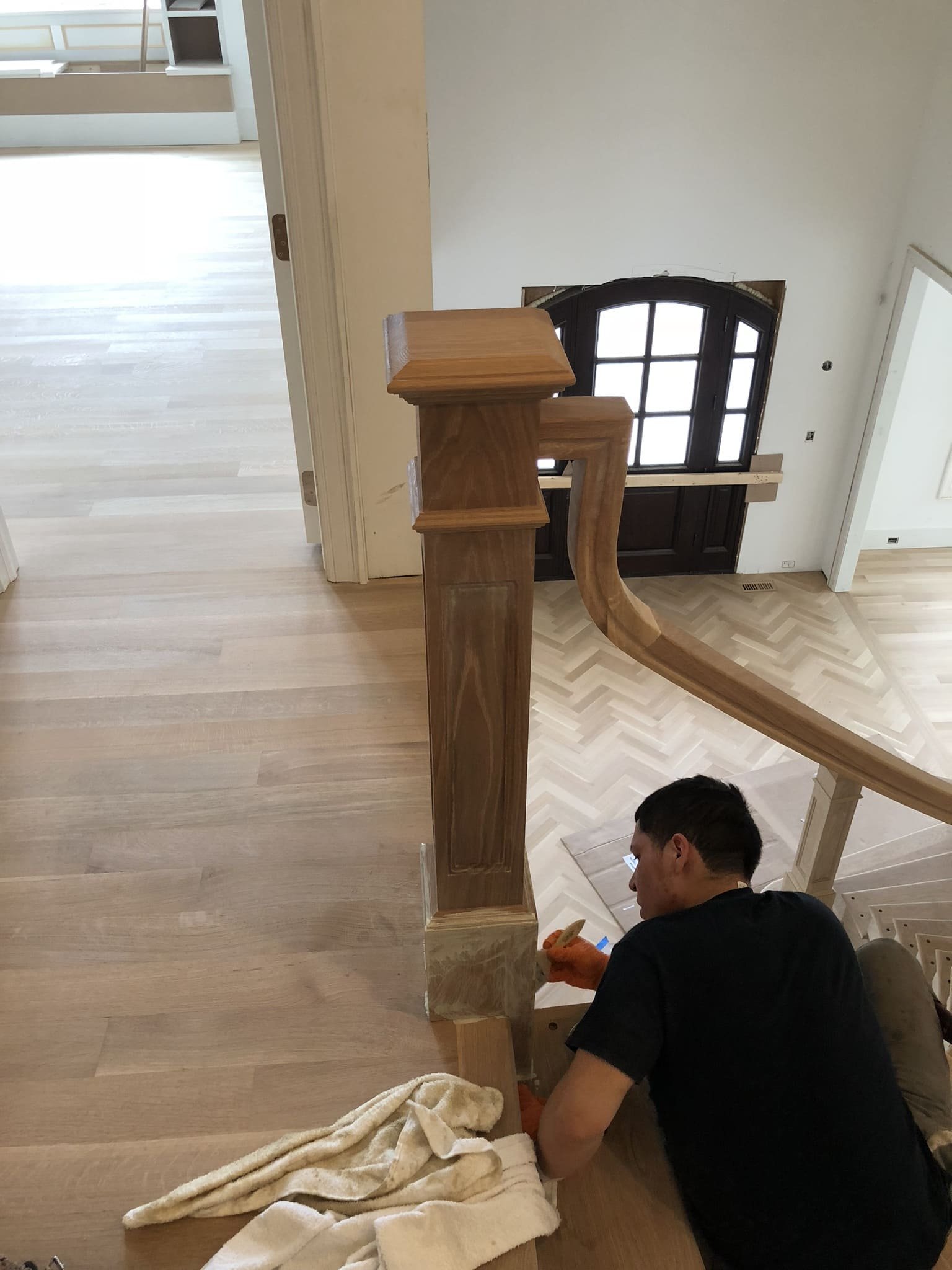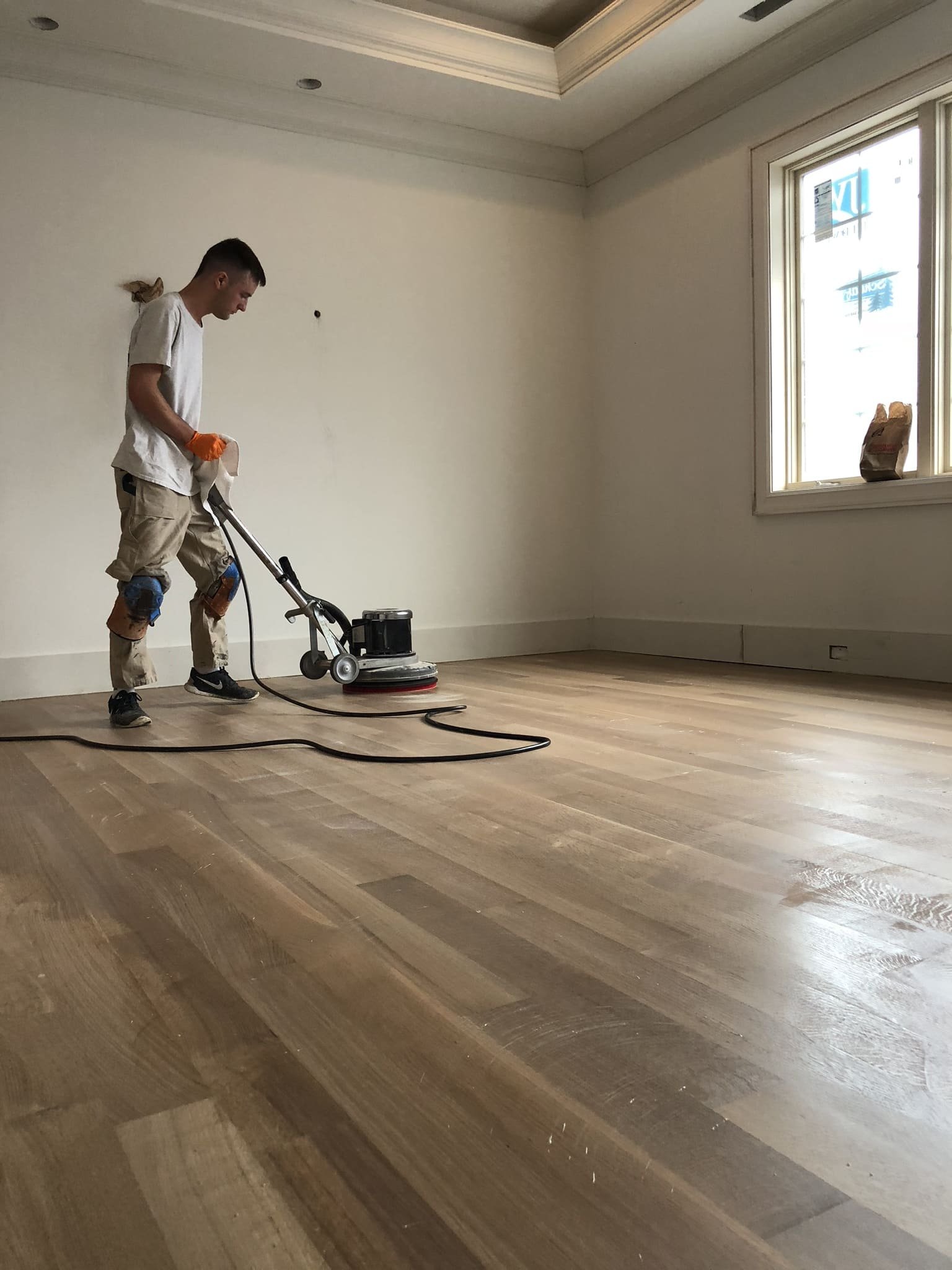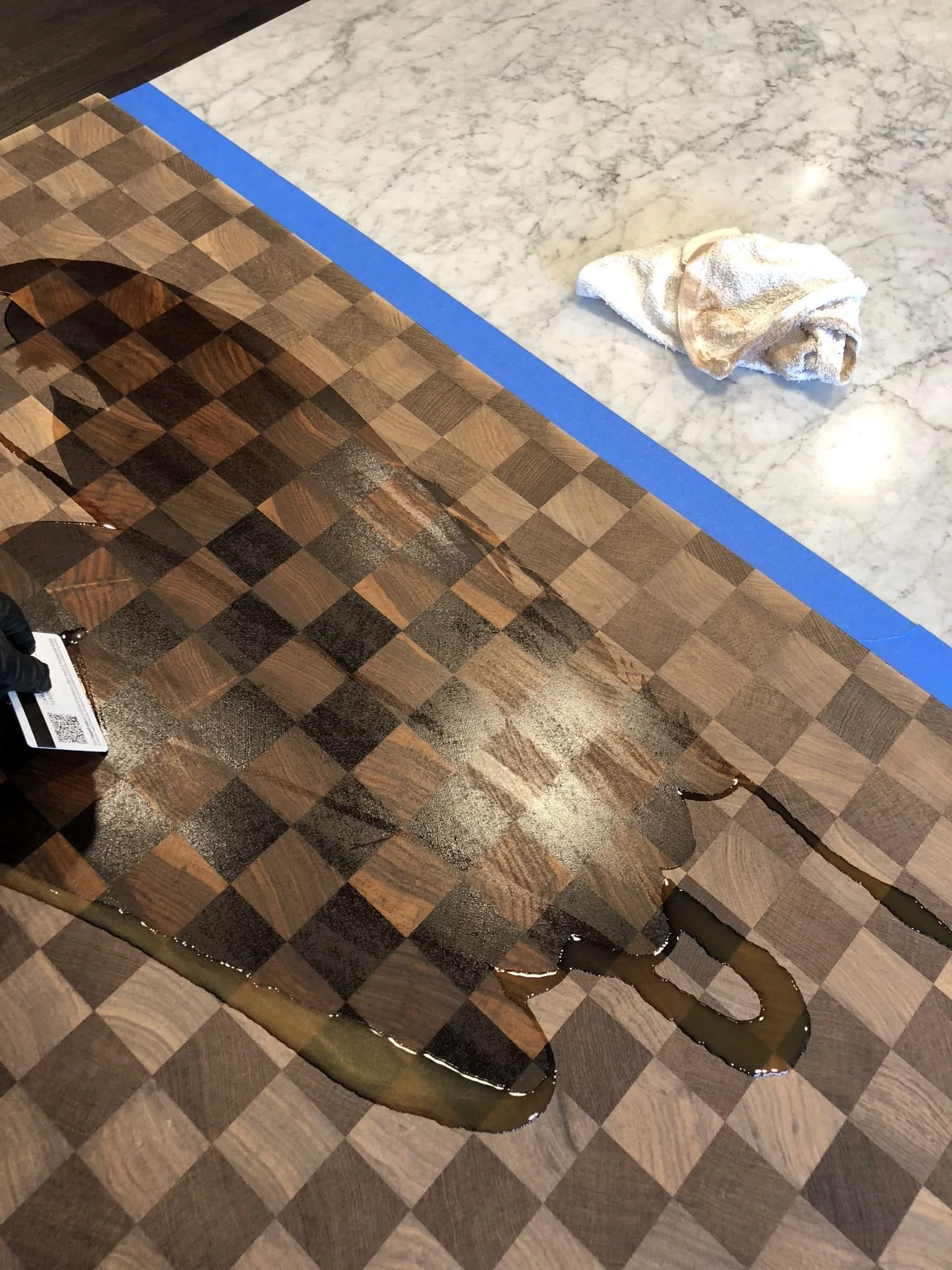How Durable is Rubio Monocoat and is it the Best Choice?
Hey guys, Patrick here. This week I decided to put together a blog post for a finish we use very regularly, Rubio Monocoat. We’ve applied a ton of this product over the years. I hope you enjoy it!
Wood captivates with its natural charm and elegance, but keeping it in top shape is a real task. That's where Rubio Monocoat comes in – a linseed-based hardwax oil that not only preserves the beauty of wood but also offers unmatched durability. It bonds deeply, protecting your wood from daily wear while highlighting its natural grain. Let's learn more about what makes Rubio Monocoat so resilient and so special. If by the end of this you still feel like learning more about Rubio, please check out this other extensive post I’ve made about it.
Exploring The Resilience Of Rubio Monocoat
One liter can of Rubio Monocoat 2c Oil. This is the main Rubio Monocoat product used for floors
Rubio Monocoat stands out as a superior choice for protecting wood. This wonder oil is not just another wood finish – it is a protective shield that molecularly bonds with the wood, providing robust protection that lasts. The result? A natural look of the wood that’s preserved and protected, no matter what wood species you’re working with. The fact that the finish bonds from the inside, and doesn’t build protective film layers from the top side, allows for a very ultra matte appearance.
Rubio Monocoat is lauded for its:
Stunning aesthetics
Durability
Easy Re-Oiling Process
Vast Color Selection
Rubio works great for all natural wood surfaces. Today, I’ll go over its resilience in detail, from the scientific basis of its durability to its performance in real-life conditions. I’ll also go over my personal experiences with this product.
The Science Behind Rubio Monocoat's Durability
At the heart of Rubio Monocoat’s remarkable durability lies its unique molecular bonding process. Unlike traditional oil finishes that simply sit on top of the wood, Rubio Monocoat permeates the wood fibers and bonds with them at a molecular level. This creates a durable, long-lasting finish that:
Protects the wood from the inside out
Enhances the natural beauty of the wood
Requires only one coat
Does not contain any harmful chemicals or VOCs
With Rubio Monocoat, you can trust that your wood surfaces will be protected and look stunning for years to come.
The choice of finish, including the color, also plays a role in the durability of Rubio Monocoat. For instance, the Pure finish is not pigmented but has the natural hue from the linseed oil, providing a pure finish, while the Natural finish is pigmented with yellow/white tones to balance the richer shades generated by the linseed oil.
Regardless of your color preference, Rubio Monocoat boasts an extended shelf life and a quick curing time, promising a finish that endures as long as your passion for wood. HOWEVER, you should note that only the 2c oil product can be used for actual hardwood floors. The added “B part” hardener is 100% required if you are going to put this product on your floors.
Real-Life Durability Tests
Pouring some Rubio out onto a brand new Rift & Quartersawn White Oak floor
Rigorous lab tests are great, but what about real-life conditions? How does Rubio Monocoat hold up against the daily grind, the accidental spills, and the household pets?
Besides being water-resistant, Rubio Monocoat also stands up admirably under high foot traffic when properly maintained. We’ve applied this many times over the years, and any homes we revisited that had Rubio Monocoat applied all held up very well, apart from a couple of instances. I’ll go further into detail on my personal thoughts about the durability of this product below.
Please note, that even though this product is considered durable, you’ll still have to apply a regular maintenance re-oiling coat probably every 3-6 years to achieve the most optimal results and performance. You will also have a couple of other factors to keep in mind, too, like the fact that you can only use their Rubio Soap cleaner to wash your floors. Don’t worry, I’ll go into this in more detail down below.
Longevity: Shelf Life And Cure Time
A major factor in the durability of a wood finish is its shelf life and cure time. Rubio Monocoat does well in both these aspects. Being a natural oil, this product has a prolonged shelf life, even when it isn’t used. However, once it is mixed with the hardener, you only have an open working time of a couple hours.
When it comes to cure time, Rubio Monocoat Oil Plus 2C is 80% cured in two days and fully cured within five days. This fast curing time means your wood surfaces will be ready for use in no time. And once cured, Rubio Monocoat provides a lifetime of protection. The first maintenance should be conducted between 3-6 years, ensuring a long-lasting, beautiful floor for many years to come.
Protective Qualities Of Rubio Monocoat Oil
Applying Rubio Monocoat using the troweling process
Protection is the cornerstone of any good wood finish, and Rubio Monocoat is no exception. It offers top-notch protection from heat, water, and wear, thereby increasing the durability and longevity of wood.
Whether you’re looking to protect a curly maple table or a white oak floor, Rubio Monocoat 2c Oil is up to the task. With its wide range of colors, you can find the perfect hue to enhance the natural grain of your wood and achieve the exact look you want. An added bonus? Rubio Monocoat Oil Plus 2C colors can be mixed and matched for a genuinely customized finish. What you’ll find is that this product is also incredibly popular with furniture makers as well as cabinet and table builders. To be honest with you, the product works very easily in smaller applications such as that. For an entire flooring project, this can still be quite a tricky product to tackle. But that’s why I’m here to help!
Water Resistance
In the battle against water, I’d say this product does fairly well. But, I’m going to be honest with you here and realistic. No, it isn’t going to make your floors waterproof, nothing will. However, it’s also important to note that, even though this will offer protection against water spills, it might not offer the best protection for such mishaps.
Why do I say this? Because I genuinely believe that Rubio Monocoat has a much better scratch resistance than water resistance. This means that the product will probably hold up better to scratches then it will to spills. That doesn’t mean it isn’t going to protect your floors from a spilled glass of water, but what is does mean is that you should definitely still wipe up a water spill, if it does happen.
Defense Against Daily Wear
This category is where I really feel like Rubio actually stands out quite a bit. I genuinely believe that Rubio actually has a much better scratch resistance than most other flooring products on the market. This includes both oil & water based finishes. I think for scratch resistance, Rubio beats these by a mile.
The issue? The issue is again, the water resistance. The wood not having a top layer of film protection means that anything that does get spilled onto the floor will permeate through the protective layer quicker and could cause actual staining or damage to the floors. For a small water spill this usually isn’t a big deal. But what if your pets throw up on the floor? And what if you don’t see it right away? Yep, as you can imagine, THAT is the main drawback of the product. That chemical resistance certainly suffers especially when something acidic sits on the floors for too long.
Maintaining The Strength Of Your Rubio Wood Floor Finish
Jon applying Rubio Monocoat to the stair posts by hand
Having a beautiful Rubio Monocoat floor & finish is one thing; maintaining it is another. But don’t worry, Rubio Monocoat is designed to be super low-maintenance, so you can enjoy your beautiful wood surfaces without any hassle!
…but is it actually? You decide.
Cleaning And Care With Rubio Monocoat Soap
Cleaning a Rubio Monocoat finish is a breeze, thanks to Rubio Monocoat Soap. But there lies the problem itself…because you can’t clean the floors with anything besides their very specific soap.
But Rubio Monocoat Soap does more than just clean. At least, that’s what they claim. The reasoning behind having to only use their specific cleaning soap, is that it helps to restore the surface back to a freshly oiled condition. That means every time you clean your floors, the soap acts as a very light re-oiling to your floors. This helps in better concealing minor scratches and preserving the look of the finish.
So is any of that actually true? Well, yes, to a certain extent I’d say it’s true. You certainly have to use their soap to wash your floors, there is no denying that. I definitely agree that the soap, being a natural oil too, has great properties that help preserve the floors. But I think, the bigger thing to keep in mind, is not the benefits that cleaning your floors with this soap will have. No, the more important thing to remember is that if you don’t clean the floors with this product, you’ll likely ruin them. If you use a harsher cleaning agent on floors finished with Rubio Monocoat, you will entirely ruin the surface sheen. You will make the product uneven not only in color, but in appearance.
Refreshing Your Rubio Monocoat Finish
Buffing Rubio Monocoat deep into the grain of the White Oak flooring (don’t mind my McDonalds bag on the window lol)
Alright, so maybe cleaning floors with Rubio Monocoat isn’t super duper easy after all. But that’s fine, because having us come in to maintain them is super inexpensive and easy, right!?
Well, again, to a certain extent. Yes, it’s very easy to have us come back, and reapply a new coat of Rubio to your floors. This WILL make them look almost like brand new again. It helps with a ton of surface scratches, and usually removes 96% of any blemishes or wear & tear.
So what’s the problem? The problem is you’ll have to get all of your furniture back out if you want us to come apply a new coat of finish. Sure, you can leave any bigger dressers and tables in place, we can certainly go around them. But, if you ever move out or put the home up for sale, the spots that did not recieve a new coat of Rubio will be dull. Can it be fixed? Yes, you’ll just have to do another re-oiling again.
Comparison With Other Finishes
So, how does this product stack up again other finishes like traditional oil and water based finish? Well, I think it’s tough to compare. Mainly because, the finish is so different compared to the standard ones offered. Here are some of the main differences. If you really want to do some more in depth research on how Rubio stacks up versus a normal finish, I’ve already got a post going way further into depth right here.
Hardwax Vs. Oil Polyurethane
When compared to other finishes, the hardwax oil wood finish, Rubio Monocoat, stands out in several ways:
Hardwax finishes are applied by hand and provide a more natural, matte appearance.
Oil polyurethane finishes offer a glossy finish but may need to be sanded and refinished over time. They also smell atrociously.
Rubio Monocoat offers a very wide range of color options. Many of these color options are not available with traditional staining products.
Personal Experiences With Rubio Monocoat
Final buffing pass, removing any excess Rubio from the floor. This is by far the most important step
Hearing about the benefits of Rubio Monocoat is one thing, but seeing it in action is another. Nothing beats personal experiences when it comes to understanding the true value of a product. And believe me, I’ve got plenty of experiences to share.
From Floors To Furniture Pieces
Applying Rubio Monocoat Pure to a built-in kitchen cutting board
Throughout the years, I’ve used this product so much. I’ve applied it to almost every species of wood you can think of, and I’ve applied it to more floors then I can count. But that isn’t it. I’ve also applied this product to cutting boards, chairs, tables, shelves, bookcases, and all sorts of furniture.
Finished picture of the same cutting board half an hour later
So what are my honest unfiltered thoughts? It’s an amazing product. But it’s only amazing if you specifically know what you want, and if you understand all of the care and maintenance involved with this product. I like to use a car analogy, so car guys stick with me here. This product is like buying a brand new Porsche GT3 RS. But after you buy that Porsche, what do you do? You don’t take it through the auto carwash, do you? No, you’ve got to get this thing hand washed. And after you get it hand washed, you need a ceramic coat applied to the surface. That ceramic coat needs to be maintained and reapplied once it starts getting worn down…well this works the exact same way and it is the exact same concept.
All in all, I think this is a very cool product. But it works well only for homeowners without a budget, where appearance and color satisfaction are much more important than actual project budget or maintenance worries. I believe situations where the client or designer want the floors to look like super matte, like raw wood, are ideal for this product. Also, situations where designers want crazy specific or difficult to achieve colors also play very well into this products strong side.
Summary
And there you have it, folks – my quick take on the wonders of Rubio Monocoat. I aimed for a crisp, clear rundown rather than a lengthy discourse. For those of you craving a deeper dive into how Rubio Monocoat stacks up against traditional finishes, I've got just the thing – check out my detailed blog post here. And remember, I'm always here for your questions and thoughts. Don't hesitate to drop them in the comments below. Until our next flooring adventure, stay fabulous, dear readers!


